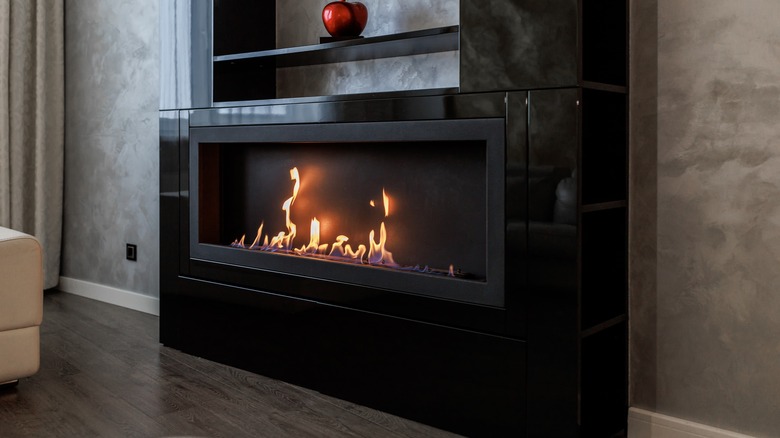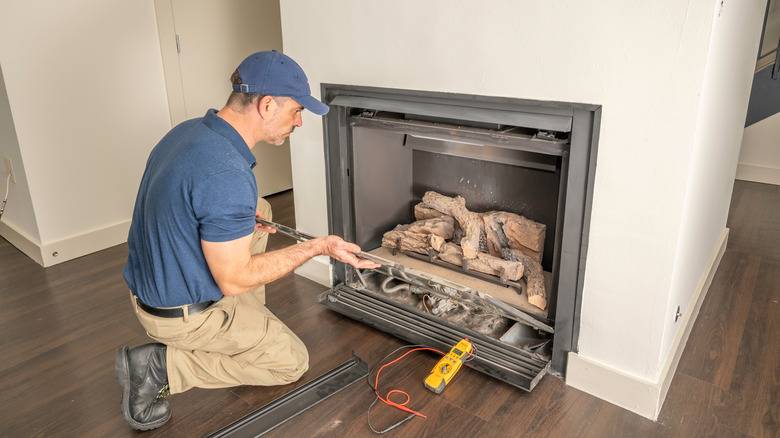Gas Vs Wood Burning Fireplace: Which Costs More To Run In The Winter?
If you're contemplating whether to install a gas fireplace or a wood-burning one, or switching from one to the other, a pivotal factor to consider is the cost of running each kind through the chilly months. The overall cost of operating a log burner or a gas fireplace is not a straightforward calculation; it hinges significantly on many factors. In addition to upfront costs, you also have to consider the long-term financial implications of your choice. There are also your usage patterns to think about. If you'll be using the fireplace frequently or plan to keep it ablaze for longer periods, you'll probably be better off with a wood burner. The reason? Gas doesn't burn as long as wood. No matter what, when using wood-burning fireplaces, you'll get more heat per log, potentially translating into more warmth for your buck in the long run.
However, it's essential to remember that the best choice for you goes beyond just economics. Each option — gas and wood — comes with its own unique set of pros and cons. These should be weighed carefully against your lifestyle and personal preferences. As you mull over these options, consider how often you see yourself kindling a fire. Are you looking for the ambiance and traditional charm of a wood-burning fireplace, or does the clean, hassle-free operation of a gas fireplace appeal more to you? Your answer to these questions will greatly influence your decision.
Understanding the costs and functionality
Let's talk gas burners first. The cost of keeping a gas fireplace glowing is tied to the current price of its fuel, which, as you know, can go up and down. A typical gas fireplace puts out about 7,000 to 16,000 BTUs (British thermal units) per hour. What that means for running costs will depend on your local gas price. If you use your gas fireplace a lot, the cost can add up. And don't forget the cost of adding a fireplace. These costs include not only the price of the gas fireplace unit, which typically begins at around $5,000, but also the additional expenses for installing a gas line and the installation process itself, which may include adding ventilation.
Now, onto wood burners. These are a bit more straightforward — they burn wood logs. The main thing that'll affect your wallet with a wood-burning fireplace is how much the wood costs in your area. This can really vary. If you're in a place where wood is cheap or maybe even free (lucky you!), then running a wood burner can be quite cost-effective. Also, the type of wood you burn makes a difference. Hardwoods, which burn slower and hotter, can give you more heat for your money compared to softer woods. As for installation, you'll need to have a chimney installed, and total costs can go as high as $11,000 if you're planning to install a brick fireplace.
Which one should I choose? Evaluating pros and cons
More than anything, the choice between a gas and a wood-burning fireplace hinges on what you value most in your home heating experience. Let's weigh in on the pros and cons of each to give you a clearer picture, starting with ease of use. With gas fireplaces, one of their biggest pros is convenience. It's as easy as flipping a switch, and you have a warm, cozy fire with no fuss. Plus, they're generally low-maintenance — no ash to clean up or logs to replace constantly. Another advantage is efficiency. Gas fireplaces are generally more efficient than wood ones. They have an energy efficiency rating of around 90%, compared to wood's 85%. This higher efficiency means gas fireplaces convert a greater percentage of their fuel into heat, leading to less waste and lower operating costs over time. However, there's a downside: the lack of authenticity.
As for wood burners, their biggest charm is the authentic experience they offer. And as noted earlier, they can also be more cost-effective in the long run, especially if you have access to affordable wood. On the flip side, they require more effort. From sourcing and storing wood to building and cleaning the fireplace, not to mention the cleanup of ashes afterward, wood burners demand more hands-on involvement. So, in deciding between gas and wood, consider what matters to you. Your choice should align with what you value most in your fireplace experience.


